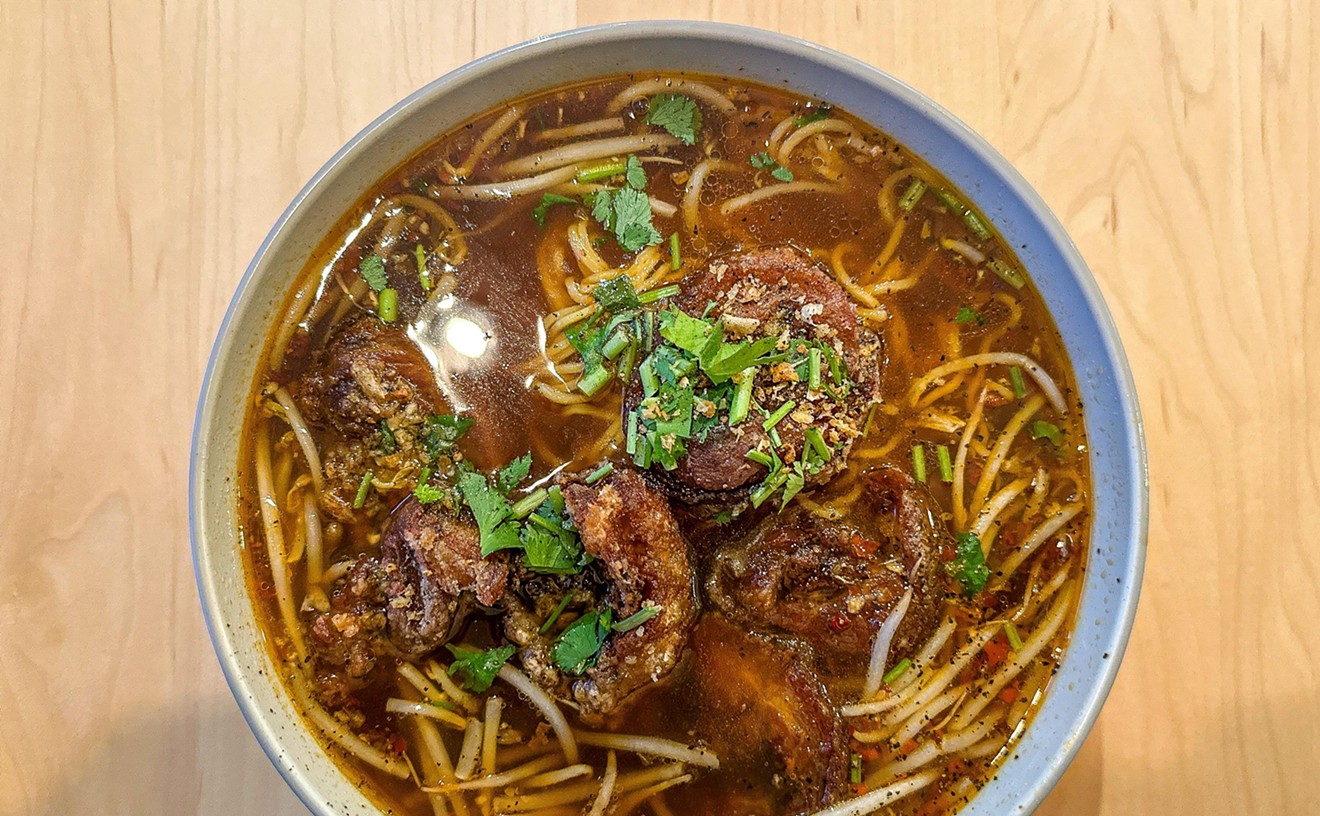Few foods scare Americans as much as blood sausage.
A number of misconceptions aren’t helping. No, blood sausage does not taste like blood; there aren’t metallic or salty notes. No, the blood of a dead animal is not more inherently gross than the flesh of a dead animal. And, for that matter, the juices coming out of a rare steak aren’t “blood,” either.
Blood sausage is a respected food around the world, from Colombia to Scotland, from the Middle East to Korea. For that matter, for most of human history, blood was perfectly fine to consume by itself. In her landmark book, Food in History, Reay Tannahill documents blood-eating among Arabs, Vikings and the Irish, who combined cows’ milk with blood from the same animal and boiled the mix in, according to a snobby French traveler, “one of their most delicious dishes.” Even in nineteenth-century England, Tannahill writes, the misery of a slaughterhouse “did not prevent gently-bred Victorians from paying it a regular visit in order to partake a strengthening glass of blood.”
The Observer does not endorse the dubious health benefits of a glass of blood. But blood sausage is not only far less weird, it’s downright tasty. And there may be no better place in North Texas to enjoy it than Ajumma Kimbob Deli, a friendly little Korean restaurant on Royal Lane.
In Korean, blood sausage is called soon dae or, confusingly, “sundae.” Kimbob Deli prefers the “sundae” spelling, and features the sausage as a side ($5), in a hearty, piping-hot soup, sundaeguk ($9), or in a gigantic veggie stir-fry. The stir-fry version, sundae bokkeum ($11), boasts cabbage, hot peppers, carrots, green and white onions, beef liver and a medium-ferocity red chili sauce.
But what, exactly, does the blood sausage taste like? The flavor is not too strong, nor is it spicy, which makes this one of the more mild-mannered links around. There is, however, a funky, earthy undertone that will appeal to fans of IPAs or wines like pinotage. The sausage link itself is filled with glass noodles, which helps explain the biggest surprise about sundae: the ultra-soft texture. The sundae comes apart easily, and has little of the firmness of just about every other link sausage on earth.
Mild-mannered as it is, this meat fits nicely into the stir-fry, its flavors often hiding behind those of the vegetables and chili sauce. Be warned: sundae bokkeum is a truly monster-sized platter, literally a foot wide, enough to serve as the centerpiece of a meal for four people, or to yield leftovers for days. It might be the biggest $11 plate in Dallas.
If blood sausage still doesn’t appeal in stir-fry or soup, Kimbob Deli has a host of other good dishes, too. Tonkotsu ($9), the thin fried pork cutlet, tastes surprisingly light, with no grease and great tenderness. The soft pork slices are melt-in-your-mouth, while a heat-packing pickled jalapeno side can set the mouth aflame.
Jjol myeon ($8) literally translates as “chewy noodles,” but, like blood sausage, chewy noodles taste a lot better than they sound. Essentially a cold pasta salad, jjol myeon is a pile of noodles that give slightly between the teeth without being truly “chewy,” tossed in a garlicky red chili sauce. Ample side veggies like cabbage and bean sprouts can be eaten as side salads or mixed right into the noodles. Either way, it’s a perfect autumn meal.
And then there’s the restaurant’s title dish: kimbob. For a food that the deli enshrined in its name, kimbob does not look appetizing; the restaurant sells it shrink-wrapped on Styrofoam to-go plates ($3 to $7.50, depending on size). Often spelled gimbap, the namesake food is a variation on norimaki sushi, with dried seaweed wrapped around a thick layer of rice and a small clutch of vegetables with good fresh crunch. The unappetizing presentation hides the fact that these rolls really are made fresh.
A more visually enticing starter is the mantoo, or dumplings ($5 for six). Stop in at the right time and you can watch the dumplings get assembled, from an enormous mound of ground pork, tiny-diced carrots, scallions and spices. The dumplings are very lightly fried, just enough to turn golden on the very edges.
More standard Korean fare, of the sort that’s becoming a household name in Dallas, isn’t always exciting at Kimbob Deli. Udon noodles are available in a clearish soup ($7) with flavorful, slightly salty broth and too few veggies. It might be wiser to go for haemuludon bokkeum ($11), in which the noodles are stir-fried with a variety of seafood and more of that garlicky chili sauce.
Bibimbap makes for a bargain on weekday lunches, with $7 also netting a side of kimchi and small cup of soup. It’s a lighter, less meat-centric interpretation than the Americanized version at Bbbop, and meekly withstands a whole lot of added hot sauce.
Service at Ajumma Kimbob Deli couldn’t be more basic. Order at the counter, grab a cup of water, take a seat and wait a few minutes. The folks behind the counter shout out the name of each dish as it becomes ready, and if a clueless non-Korean fails to take the hint, they will start pointing or waving. It’s a small space, which makes the process a little chaotic but hard to miss.
Dallas’ Korean restaurant scene is one of our most diverse, exciting culinary assets. If you only know Korean food for barbecue and rice bowls, there are exciting discoveries ahead: the fried chicken at Rice Chicken, seafood and soups at Dal Dong Ne, Gangnam Sushi’s gonzo specialty rolls, beef broth at La Han Bat.
And, at Ajumma Kimbob Deli, you’ll find delightful cold spicy noodles, lightly-fried dumplings and chili-kicked stir-fries. Oh, and don’t forget the sundae. Blood sausage is mild-mannered, yes, but this misunderstood food is more tempting than you might think.
Ajumma Kimbob Deli, 2240 Royal Lane, Dallas. Monday through Saturday, 10 a.m. to 8 p.m.; to-go only after 7:30 p.m. Closed Sundays.
[
{
"name": "Air - MediumRectangle - Inline Content - Mobile Display Size",
"component": "18855504",
"insertPoint": "2",
"requiredCountToDisplay": "2"
},{
"name": "Editor Picks",
"component": "17105533",
"insertPoint": "4",
"requiredCountToDisplay": "1"
},{
"name": "Inline Links",
"component": "18349797",
"insertPoint": "8th",
"startingPoint": 8,
"requiredCountToDisplay": "7",
"maxInsertions": 25
},{
"name": "Air - MediumRectangle - Combo - Inline Content",
"component": "17105532",
"insertPoint": "8th",
"startingPoint": 8,
"requiredCountToDisplay": "7",
"maxInsertions": 25
},{
"name": "Inline Links",
"component": "18349797",
"insertPoint": "8th",
"startingPoint": 12,
"requiredCountToDisplay": "11",
"maxInsertions": 25
},{
"name": "Air - Leaderboard Tower - Combo - Inline Content",
"component": "17105535",
"insertPoint": "8th",
"startingPoint": 12,
"requiredCountToDisplay": "11",
"maxInsertions": 25
}
]











